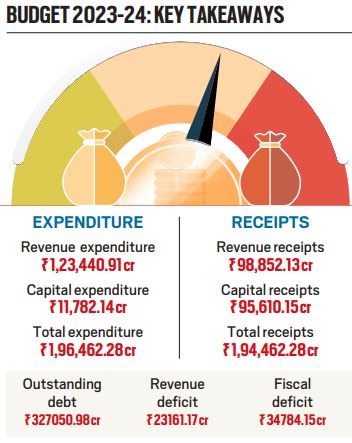Punjab Budget 2023 | Diversification finally gets much-needed push: Rs 1,000 crore
Punjab Finance Minister Harpal Cheema proposed an allocation of Rs 13,888 crore for the financial year 2023-24 for agriculture and allied sectors, which is 20 per cent more than what was in 2022-23.
 In Punjab, a huge area needs to be diverted from under paddy to other crops including Basmati, cotton, maize, pulses and oilseeds. (File Photo)
In Punjab, a huge area needs to be diverted from under paddy to other crops including Basmati, cotton, maize, pulses and oilseeds. (File Photo) Quoting farm scientist Dr MS Swaminathan — considered the Father of the Green revolution in India — that “if agriculture goes wrong, nothing else will have a chance to go right”, Punjab Finance Minister Harpal Cheema Friday said it was high time for a course correction and announced an initial allocation of Rs 1,000 crore for a special scheme on diversification. Cheema proposed an allocation of Rs 13,888 crore for the financial year 2023-24 for agriculture and allied sectors, which is 20 per cent more than what was in 2022-23.
“The hardworking farmers of our state single-handedly fed India…Like a mother immersed in feeding her children, Punjab did not worry about her own health. Today, our soil has lost natural nutrients, the water table has considerably depleted, chemical fertilisers and pesticides have poisoned our environment,” Cheema said before announcing the allocation diversification.
With this, diversification, which is a decades-old need of the state, may finally get the much required push. Experts termed the amount as meager, but added that at least things would start moving in the right direction if it is implemented at the ground level in the right earnest.
In Punjab, a huge area needs to be diverted from under paddy to other crops including Basmati, cotton, maize, pulses and oilseeds. It would include market intervention by the government for Basmati procurement, for which a revolving fund would be created and a 33 per cent subsidy on cotton seeds would be offered.
Bhartiya Kisan Union (Dakaunda) leader Jagmohan Singh said that not only Basmati and cotton but all the alternative crops of paddy must be included in the list for diversification allocation. “I welcome this step. But in Punjab where at least one million hectare area is required to be diverted from paddy to other crops, it is just a baby step. The state government must take financial help from the Centre to expand the ambit”. He said government must announce the minimum support price (MSP) for Basmati before sowing and can utilise the services of Markfed (Punjab’s Cooperative Supply and Marketing Federation Limited) to sell Basmati both in India and abroad.
 Punjab Budget 2023: Key takeaways
Punjab Budget 2023: Key takeaways
For the farmers who are switching over two oil seeds, Cheema announced setting up of a 110 tonne palm oil refinery at Khanna and Sarson refinery to be set up by MARKFED at Budhlada and Gidderbaha, respectively. He said the state government will introduce a new agricultural policy to conserve natural resources and increase farmers’ income.
A sum of Rs 125 crore was allocated for an incentive of Rs 1,500 per acre for direct seeding of rice (DSR) and procurement of moong crops at the minimum support price.
“The DSR can be safely adopted in at least 50 per cent of rice growing area of the state where the land is suitable for it,” said am expert from Punjab Agriculture Department.
Cheema also announced to provide crop insurance for farmers to save them from the vagaries of the weather and other uncertainties. The earlier government had not agreed to sign up with Centre’s crop insurance scheme as the state did not agree with certain riders including that of irrigation of crops with Tubewells.
“Under agricultural extension services, the government has decided to engage 2,574 Kisan Mitras to provide extension services in each village and spread information and knowledge at farmers’ doorstep. This will not only generate employment at the village level but shall help farmers to go for the best agriculture practices,” said a senior officer.
Further, a new scheme for diversification through flower seed production would also be operationalised in the upcoming financial year, Cheema said.
Speaking on new and renewable energy, Cheema said the state government intends to solarise all diesel-based agriculture pump sets in the next five years with a mission to solarise the entire agriculture pump sets of the state by 2030.
Speaking on the fisheries sector, he said there is a plan to expand the current 1,212 acres area under shrimp cultivation to 5,000 acres in the next five years and for which, an initial allocation of Rs 10 crore has been made. A mini fish feed mill of two-tonne capacity has been established at Jalandhar, with the government subsidy.
In 2023-24, an ice plant of 30 tonne capacity for the preservation of fish, shrimp and its products is proposed to be established, he said.
In another step towards checking stubble burning, Cheema said that the state has notified replacement of 20% of coal with paddy straw briquettes as fuel in approximately 2,500 brick kilns operating in Punjab and the same shall become applicable from May 1 onwards.
 Finance Minister Harpal Cheema before presenting the budget. (Express Photo: Kamleshwar Singh)
Finance Minister Harpal Cheema before presenting the budget. (Express Photo: Kamleshwar Singh)
Horticulture
To promote the area under fruit and vegetable crops in their natural growing regions, the government intends to set up five new horticulture estates in Ludhiana, Gurdaspur, Patiala, Bathinda and Faridkot.
“Our Government has also decided to launch a new risk mitigation scheme i.e. ‘Bhaav Antar Bhugtan Yojna’ for horticulture producers. The government would intervene to ensure the right remuneration to horticulture producers, whenever market prices would fluctuate beyond a certain level. I propose an initial allocation of Rs 15 crore for this purpose,” Cheema said.
The potato growing farmers, however, termed the allocation as negligible.
“The amount is ngligible and there is no idea how the government will pay the difference with this meagre amount,” said farmer Paramjit Singh, a potato grower who is facing huge losses due to a drastic fall in tuber rates this season. He said that it is a clear indication that potato crop would not be included in this scheme, even though the state is a hub of seed potato production.
‘Punjab can expect own apple orchards in 2 years’
While speaking on the horticulture sector, Finance Minister Harpal Cheema said, “It is a pleasure to tell this House that Guru Nanak Dev University, Amritsar, has created an apple variety through tissue culture, which is suited for Punjab’s climate conditions. In the next 2 years, we can expect Punjab to have its own apple orchards, which are only seen in hill states”.
Bhartiya Kisan Union (Dakaunda) leader Jagmohan Singh , however, asked government was not focusing on research and betterment of ‘kinnow’ and other best-suited fruits such as peaches and pears. “The neighbouring states of Punjab are already growing surplus apples. We should promote our natural fruits,” he added. — ENS







